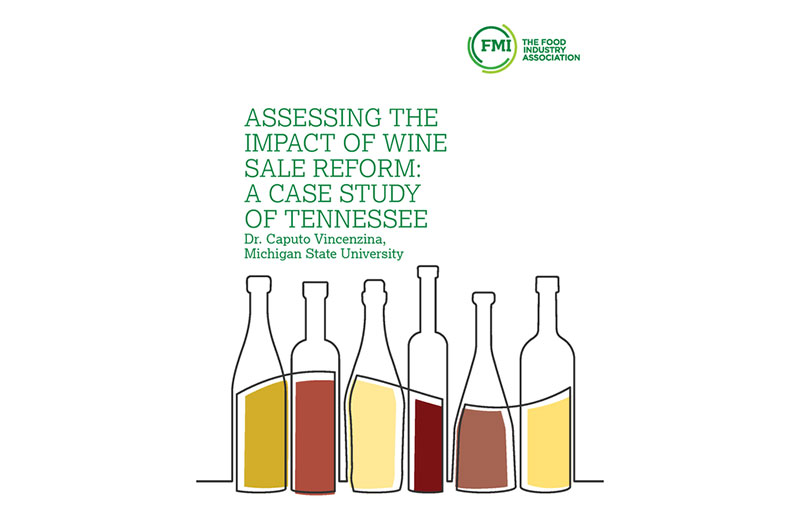FMI – The Food Industry Association has released a new report that explores whether allowing grocery stores in Tennessee to sell wine eight years ago led to liquor store closures and changes in state sales tax revenues.
Through the creation of a “synthetic” Tennessee, the report by Vincenzina Caputo of Michigan State University examines what would have happened in the state if wine sales were not permitted and compares those results with real-world outcomes since 2016.
Titled “Assessing the Impact of Wine Sale Reform: A Case Study of Tennessee,” the report also compares present-day Tennessee with other states that do not allow wine sales in grocery stores. The research indicates that liquor stores did not see a statistically significant increase in closures, and that state sales tax revenues rose due to the growth in demand for and purchase of wine at grocery stores.
“Consumers value the convenience of being able to purchase a bottle of wine to have with dinner at the same location where they shop for their groceries,” said FMI VP, State Government Relations Elizabeth Tansing. “Through this research, we have shown that allowing wine sales in grocery stores does not lead to liquor store closures as some would suggest, and in fact has positive benefits for the state in increased tax revenues while at the same time giving consumers greater options for making their wine purchases.
“There are still 11 states that don’t allow wine to be sold at grocery stores. This research demonstrates that state governments can be confident that allowing wine sales in grocery will not harm the liquor store sector, will bring additional revenues to state coffers and will provide shoppers with greater choice.”
In other alcohol-related news, the Pennsylvania Food Merchants Association recently applauded Senate Bill 688, which amends the commonwealth’s liquor code to allow grocery and convenience stores to sell ready-to-drink (RTD) beverages, also known as canned cocktails.
“Senate Bill 688, which has now passed both the Senate and the House, represents a significant step forward for our industry,” said Alex Baloga, president and CEO of the PFMA.
“It offers consumers greater convenience and choice while supporting local businesses. We eagerly await the governor’s signature to bring this exciting change to our state. This bill not only meets the evolving preferences of our customers but also provides a boost to our economy by opening new market opportunities for retailers.”
Under current law, the products are restricted to state-run liquor stores because the base alcohol is liquor. A 2021 public opinion strategies study (PDF) on the issue of RTDs found that 86 percent of consumers and non-consumers of RTD beverages believe they should be sold alongside other options like beer and wine.

